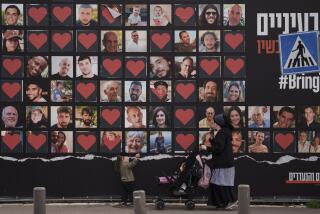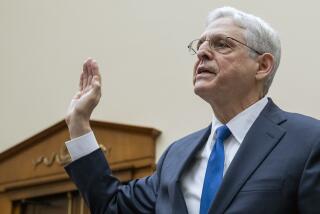Terrorism case prosecutor turns ire on ex-envoy
- Share via
DALLAS — The largest terrorism financing trial in U.S. history closed Wednesday with a federal prosecutor leveling harsh personal criticisms at a former high-ranking American diplomat who contradicted Israeli intelligence and key elements of the government’s case.
At stake is the prosecution of five former officials of the Holy Land Foundation for Relief and Development. They are accused of using the now-defunct Islamic charity to funnel $12 million to the terrorist group Hamas through local Palestinian charities in the Gaza Strip and West Bank. An Israeli intelligence agent testified that those local so-called zakat committees were well-known fronts for Hamas.
But retired career diplomat Edward Abington, a former U.S. consul general in Jerusalem and one-time deputy assistant secretary in the State Department’s intelligence and research bureau, testified that he was briefed daily by the CIA while serving in the Middle East and never heard of any Hamas links to the Holy Land-backed charities. He also testified that he personally visited the zakat committees and found nothing suggesting Hamas involvement.
The purported Hamas link to zakat charities is crucial to the government’s case that Holy Land officials knowingly assisted terrorists. But that link relies almost entirely on the testimony of one Israeli agent, identified only as “Avi” during an unusual closed-court appearance.
Faced with Abington’s contradictions, Assistant U.S. Atty. Nathan Garrett targeted the former ambassador’s credibility and even his diplomatic service. In closing arguments clearly calculated to blunt Abington’s influence among jurors, the prosecutor said: “I was a bit embarrassed that he was the best the U.S. had to send to Jerusalem.”
In a summation that ranged from folksy to incendiary, Garrett repeatedly sought to bolster the Israeli agent’s credibility, referring often to Avi and endorsing his testimony. Garrett also cited the timing of Holy Land’s creation, roughly the same period as the birth of Hamas.
“Look at the organization, purpose and design of the Holy Land Foundation,” Garrett said, arguing that “it doesn’t fit” that Holy Land was a legitimate charity when it was founded at the same time as Hamas, had officials with relatives who are top leaders in Hamas and sent money to Palestinian areas where Hamas has political strength.
In addition to Abington’s testimony, the government’s case also came under fire from Nathan Brown, a George Washington University professor and expert on Middle East charities. He described allegations by the Israeli agent as biased.
Garrett dismissed Brown as “a nice guy” who had no real knowledge about Hamas and whose expertise in this case could not compare with Avi’s. As for Abington, Garrett said he “doesn’t speak for the State Department and he sure doesn’t speak for the United States.”
The prosecutor added: “Forgive me for my bluntness. Neither one of them knows squat about Hamas.”
Garrett’s broadsides followed closing arguments by defense lawyer Linda Moreno, who told jurors the government’s case hinged on questionable documents, biased witnesses and an unconstitutional effort to close down a worthwhile charity.
Moreno said her client, a former chairman of Holy Land, “did not support terrorism . . . did not support violence and did not support Hamas. What he did was support the children of Palestine.” Moreno called it a case built on fear. She urged jurors “to be courageous, to look beyond the fear that they are trying to impose on this courtroom.”
A four-man, eight-woman jury begins deliberating the case today.
--
More to Read
Sign up for Essential California
The most important California stories and recommendations in your inbox every morning.
You may occasionally receive promotional content from the Los Angeles Times.













